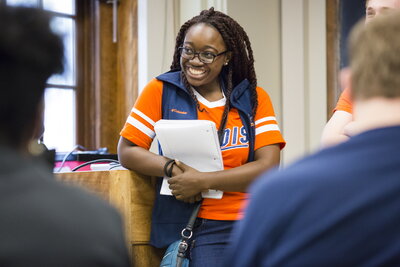

Our flexible secondary education track will prepare you for your future career in social studies education.
The main difference between this track and the general history major is that this track is designed to provide you with an Illinois social studies teaching license (9th-12th grade). This track focuses on the development of historical skills while providing you with robust educational experience within the classroom and pedagogical training and support.
You are not limited to a social studies education and can seek out additional endorsements for your license in fields like economics, psychology, political science, and foreign languages.
You can also take advantage of internships, study abroad, and other professional development opportunities. You will not only develop a mastery of history, but also the skills necessary to guide students in their journey into the past.
Apply to the secondary education minor
After completing the pre-requisite coursework (see the list of courses under pre-requisites to apply to the minor in the degree requirements below) current U of I students can apply to the secondary education minor with the College of Education for admission effective in the spring semester of their junior year. More information on eligibility requirements and the application form can be found on the College of Education website.
If you're transferring into the University of Illinois from another institution and hoping to apply to the secondary education minor, visit our transfer students webpage to make sure you have all the pre-requisite courses.
Secondary Education Track Degree Requirements
The secondary education track requires 33 hours of history + supporting coursework in the social sciences and a 36-39 hour education core.
The majority of your general education requirements can also be completed by progressing through this coursework including advanced composition, all three cultural studies requirements (western, non-western, U.S. minorities), both humanities and the arts requirements, and both social and behavioral sciences requirements.
Pre-requisites to apply to the minor
The following classes should be completed or in progress when applying to the minor.
Preliminary coursework:
- SOC 100: Introduction to Sociology
- PSYC 100: Intro Psych
Students must also take at least one of the following courses:
- PS 100: Intro to Political Science
- PS 101: Intro to US Gov & Pol
- PS 240: Intro to Comp Politics
- PS 241: Comp Politics in Dev Nations
Introductory history coursework: Students must take at least two of the three following history courses
- HIST 100: Global History
- HIST 141: Western Worlds: Ancient and Medieval Societies from the Mediterranean to Northern Europe or HIST 142: Modern Europe and the World
- HIST 171: US History to 1877 or HIST 172: US History since 1877 or HIST 174: Black America, 1619-Present
Additional history coursework:
- A 200 level history course (HIST 200: Intro to Historical Interpretation is recommended)
Pre-professional education coursework
- EPSY 201: Educational Psychology
- EDUC 201: Identity and Difference in Education
- EDUC 202: Social Justice, School and Society
Social science core
- ECON 102: Microeconomic Principles or ECON 103: Macroeconomic Principles
- Any GGIS course
History coursework
Core history coursework
NOTE: History courses taken as a pre-requisites to apply to the minor also apply toward this category.
- HIST 100: Global History
- HIST 141: Western Worlds: Ancient and Medieval Societies from the Mediterranean to Northern Europe or HIST 142: Modern Europe and the World
- HIST 171: US History to 1877 or HIST 172: US History since 1877 or HIST 174: Black America, 1619-Present
- HIST 200: Intro to Historical Interpretation
- HIST 273: Illinois History or HIST 278: Native American History or HIST 382: Race and Migration in Chicago
- HIST 498: Research and Writing Seminar (this can also be applied toward the area distribution requirement)
Area distribution (100-400 level)
Non-Western History
Two courses in either African, Asia, Global, Latin American, or Middle Eastern History.
European History
Two courses in European history.
US Minority History
One course in US minority history.
US History
One course in US history.
Pre-1800
One course in pre-1800 hundred history.
Advanced hours
Advanced hours in LAS are defined as courses at the 300 and 400 level. Students are required to have a minimum of 21 advanced hours completed on campus to graduate. For students in the secondary education concentration, 12 of those hours must be history courses.
How history courses count in different areas
Note that history courses may count in more than one area, but they can only count in one area at a time.
Professional education coursework
Students will complete the below courses in sequence after applying to the minor. Courses begin in the spring semester of your junior year. In the below list, the paired courses will be taken in the same semester. These courses cannot be taken before taking the pre-requisites to apply to the minor courses, or pre-professional education coursework.
Spring semester of junior year:
- CI 401: Introductory Teaching in a Diverse Society
- CI 473: Disciplinary Literacy
Fall semester of senior year
- CI 403: Teaching a Diverse High School Student Population
- EPSY 485: Assessing Student Performance
- SPED 405: General Educator's Role in Special Education
Spring semester of senior year:
- CI 404: Teaching and Assessing Secondary School Students
- EDPR 442: Educational Practice in Secondary Education
Tools to keep you on track
Course catalog
To register and see section availability, please browse courses on Course Explorer. Course Explorer provides the schedule of classes by term and a browsable database of general education requirements in addition to other resources.
How history courses count in different areas
Note that history courses may count in more than one area, but they can only count in one area at a time.